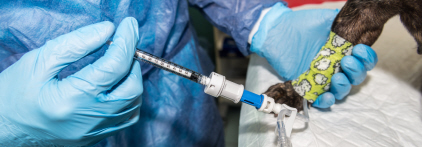Like people, our pets’ bodies develop cancer cells throughout their lifetime. In the lucky ones, these cells remain dormant and no malignancy ever grows; in others, the cells go mad systematically. The cellular delinquents bust past the body’s natural immune system, as though a gate was left open, burgeoning into abnormal cells. They do not surrender to a healthy cell’s programmed death, so the cellular delinquents multiply as they crowd out healthy cells. They don’t follow any rules and ignore signals that they are overfilling the place. For nourishment, they cause new blood vessels to form to supply them, which should be supplying healthy tissue.
ChemotherapyPet.png

Your veterinarian will talk to you about various treatment options based on the type of cancer your pet has.
These marauding delinquents can grow anywhere in our pets’ bodies, just like us: lungs, liver, spleen, kidney, intestines, bone, blood, brain, skin, muscle, mouth, nail beds, and so on.
What signs of cancer can we look for in our pets?
- Lumps and bumps that don’t go away
- Wounds that don’t heal, particularly if their appearance is changing
- Limping or other signs of pain while walking, running, or jumping
- Unexplained weight loss
- Less energy, less willingness to play, walk, and run
- Difficulty breathing
- Bleeding, including nosebleeds, skin bruises, blood in stool, urine, or vomit; pale gums can show blood loss
- Bad odors from the mouth, ears, or anus
- Abnormal discharge such as blood or pus; vomiting or diarrhea, particularly if accompanied by other signs
- Behavior changes such as lethargy, depression, lack of appetite, snapping
- Changes in urinary and bowel habits, such as straining or going too often
They range from subtle to more obvious that something is going wrong. Signs of cancer can be similar to ones seen in other diseases, so don’t assume your pet has cancer if you see one. Also don’t assume that age alone is causing lethargy or lack of playfulness.
If your pet has one or more of these signs, it’s time for a visit to the veterinarian: catching any disease process early is best because it’s easier to treat. With cancer, early detection can sometimes make the difference between good health at a reasonable cost and an expensive illness that may include death.